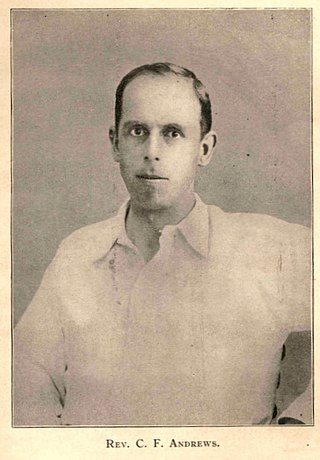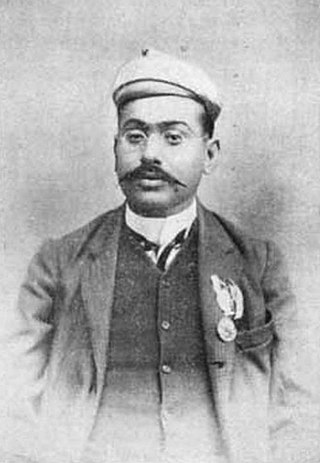Related Research Articles

Articles about people, places, things, and concepts related to or originating from Fiji, include:

Charles Freer Andrews was an Anglican priest and Christian missionary, educator and social reformer, and an activist for Indian independence. He became a close friend of Rabindranath Tagore and Mahatma Gandhi and identified with the Indian liberation struggle. He was instrumental in convincing Gandhi to return to India from South Africa, where Gandhi had been a leading light in the Indian civil rights struggle.
Badri Maharaj was an Indo-Fijian farmer, politician, and philanthropist. He was born as Badri Dutt Bamola however took on the surname Maharaj at some time after arriving in Fiji. He was the first Indian member of the Legislative Council serving for two periods between 1916 and 1923 and 1926 to 1929 as a nominated member, but he was not a popular choice for Fiji Indians, who preferred the lawyer, Manilal Doctor to be their representative. Despite his unpopularity, he was a man of principle and resigned from the Council in protest at what he believed was an unfair imposition of poll tax on the Fiji Indian people. He proposed an innovative system of Indian administration (panchayat) and showed himself to be ahead of his time by opposing child marriage and promoting education.

Manilal Maganlal Doctor was a British Indian barrister and politician, who travelled to numerous countries of the British Empire, including Fiji, Mauritius and Aden, providing legal assistance to the local ethnic Indian population. He met Gandhi, who asked him to go to Mauritius, where he represented Indo-Mauritians in court and edited a newspaper, The Hindustani. Gandhi later informed him of the need for a barrister in Fiji and he arrived in Fiji in 1912. In Fiji he also represented Indo-Fijians in court, started a newspaper, Indian Settler and established an organisation for Fiji Indians, known as the Indian Imperial Association. In 1916 when he was by-passed for nomination to the Legislative Council of Fiji, his relationship with the Government of Fiji deteriorated. The Government accused him of the violence and sabotage of the 1920 strike and deported him. He was barred from practicing law in several British colonies. He later managed to practice law in Aden, Somalia and Bihar State in India but spent his final days in Bombay.

Totaram Sanadhya (1876–1947) was deceitfully recruited as an indentured labourer from India and brought to Fiji in 1893. He spent five years working as a bonded labourer but was never afraid to fight for his rights. After completing his indenture he established himself as a small farmer and a Hindu priest but spent most of his time trying to assist the less fortunate still under the bondage of indenture. He sought the help of Indian freedom fighters and missionaries and encouraged the migration to Fiji of Indian teachers and lawyers who, he believed, could improve the plight of Indians in Fiji. After living in Fiji for twenty-one years, he returned to India, in 1914, and wrote about his experience in the book, "My Twenty-One Years in the Fiji Islands" (Hindi). This book was used as the main source of information in the campaign to end the Indian indenture system.
Parmanand Singh was one of the three Indo-Fijians elected to the Legislative Council of Fiji in October 1929 when Indo-Fijians were given the first opportunity to elect their own representatives. The other two were Vishnu Deo and James Ramchandar Rao. Singh was a landlord from Ba and undertook several business ventures which included publishing newspapers.

The Arya Samaj was the first religious, cultural and educational Fiji Indian organisation established in Fiji. From its inception, in 1904, it attracted the young, educated and progressive Hindus into its fold. During the first three decades of the twentieth century, it was the sole voice of the Indian community in Fiji and as Fiji Indians won political rights, it was not surprising that first Indian members of the Legislative Council were all Arya Samajis. The influence of Arya Samaj over the Indians in Fiji gradually waned as other organisations representing Indians were established but it remained the dominant force in politics until 1959. The modern day Arya Samaj in Fiji still speaks out on issues affecting its members and its activities are visible through the numerous educational institutions that it manages.

Chandersen Chattur Singh was an Indo-Fijian politician. He caused a major sensation in the 1937 elections when he defeated A. D. Patel, a well known lawyer and political ally of Vishnu Deo.
The Indians in Fiji are mainly descendants of the 15,132 contract labourers who were brought to Fiji between 1903 and 1916. This represents about 25% out of a total of 60,965 contract labourers who were brought to Fiji between 1879 and 1916. They were forced in to ships from Madras and were mainly recruited in the districts of North Arcot, Madras, Krishna, Godavari, Visakhapatnam, Tanjore, Malabar and Coimbatore. More than half of the labourers from South India were recruited from North Arcot and Madras, but most of those recruited in Madras were originally from North Arcot and Chingleput.
Baba Ram Chandra (1864/1875–1950) was an Indian trade unionist who organised the farmers of Awadh, India into forming a united front to fight against the abuses of landlords in 1920s and 1930s. He was also an influential figure in the history of Fiji, and owed his inspiration to take up the cause of the down-trodden to his 12 years as an indentured labourer in Fiji and to his efforts to end the indenture system. He is one of the prime characters in Kamla Kant Tripathi's history based novel "Bedakhal".
Unlike the bulk of Fiji's Indian population, who are descendants of Indian indentured labourers brought to Fiji between 1879 and 1916, the Gujaratis came to Fiji as free immigrants beginning in 1904. While the indentured labourers, on becoming free, generally took up farming, the Gujaratis were traders and craftsmen. In the Indo-Fijian population as a whole, the caste system disappeared within a few years of indenture, but the Gujaratis still maintain it and very rarely marry outside their caste. The Gujaratis continue to maintain strong links with India, usually sending their sons and daughters to be married there while the rest of Fiji's Indian population have little contact with their country of origin.
Jumna was a 1,048 GRT iron-hulled full-rigged ship that was built in England in 1867 and went missing in the Atlantic Ocean in 1899. For most of her career she was in the fleet of James Nourse.
The Indian indenture system was a system of indentured servitude, by which more than 1.6 million workers from India were transported to labour in European colonies, as a substitute for slave labor, following the abolition of the trade in the early 19th century. The system expanded after the abolition of slavery in the British Empire in 1833, in the French colonies in 1848, and in the Dutch Empire in 1863. British Indian indentureship lasted till the 1920s. This resulted in the development of a large Indian diaspora in the Caribbean, Natal, East Africa, Réunion, Mauritius, Sri Lanka, Malaysia, Myanmar, and Fiji, as well as the growth of Indo-Caribbean, Indo-African, Indo-Fijian, Indo-Malaysian, and Indo-Singaporean populations.
Babu Ram Singh was a Fiji Indian who had come to Fiji under the indenture system and was one of the few people who, after indenture, prospered and made an attempt to help his less fortunate ex-indentured brethren. Babu Ram Singhs surviving Business, Fiji Rubber Stamp Co Ltd is still under operation in Mark Street, Suva, and is looked after by his children.
Unlike the majority of Fiji's Indian population, who are descendants of Indian indentured labourers brought to Fiji between 1879 and 1916, most of the Sikhs came to Fiji as free immigrants. Most Sikhs established themselves as farmers. Sikhs also came to Fiji as policemen, teachers and preachers. In recent years large numbers of Sikhs have emigrated from Fiji, especially to the United States, Canada, the United Kingdom, Australia and New Zealand. Sikhs in Fiji are generally referred to as Punjabis.
This is a synopsis of organisations formed by Indians in Fiji. When they became free from the bondage of indenture and were able to organise themselves, they founded numerous organizations to seek social and political justice. These organisations promoted the teaching of Indian languages and religious practices and also to help others in time of need. Some of the successful organisations are listed below in the order in which they were established. Some, such as the National Federation Party, are no longer exclusively Indian, but are still predominantly so.
The Indian Association of Fiji is the name used by organisations established in Fiji seeking to unite different groups within the Fiji Indian community to facilitate the plight of Indians in Fiji.
Indo-Fijians, also known as Indian Fijians, are Fijian citizens of Indian descent, and include people who trace their ancestry to various regions of India and the Indian subcontinent. Although Indo-Fijians constituted a majority of Fiji's population from 1956 through the late 1980s, discrimination and the resulting brain drain resulted in them numbering 313,798 (37.6%) out of a total of 827,900 people living in Fiji as of 2007.
Sir Alfred Joseph Karney Young was a British barrister and judge. He held a number of political and judicial offices, including Attorney General of British East Africa, Chief Justice of the Seychelles, Attorney General of Fiji, Chief Justice of the Leeward Islands, Chief Justice of Fiji, and Chief Judicial Commissioner for the Western Pacific.
References
- Gillion, K. L. (1977). The Fiji Indians: Challenge to European Dominance 1920–1946. Australian National University Press, Canberra. ISBN 0-7081-1291-9.